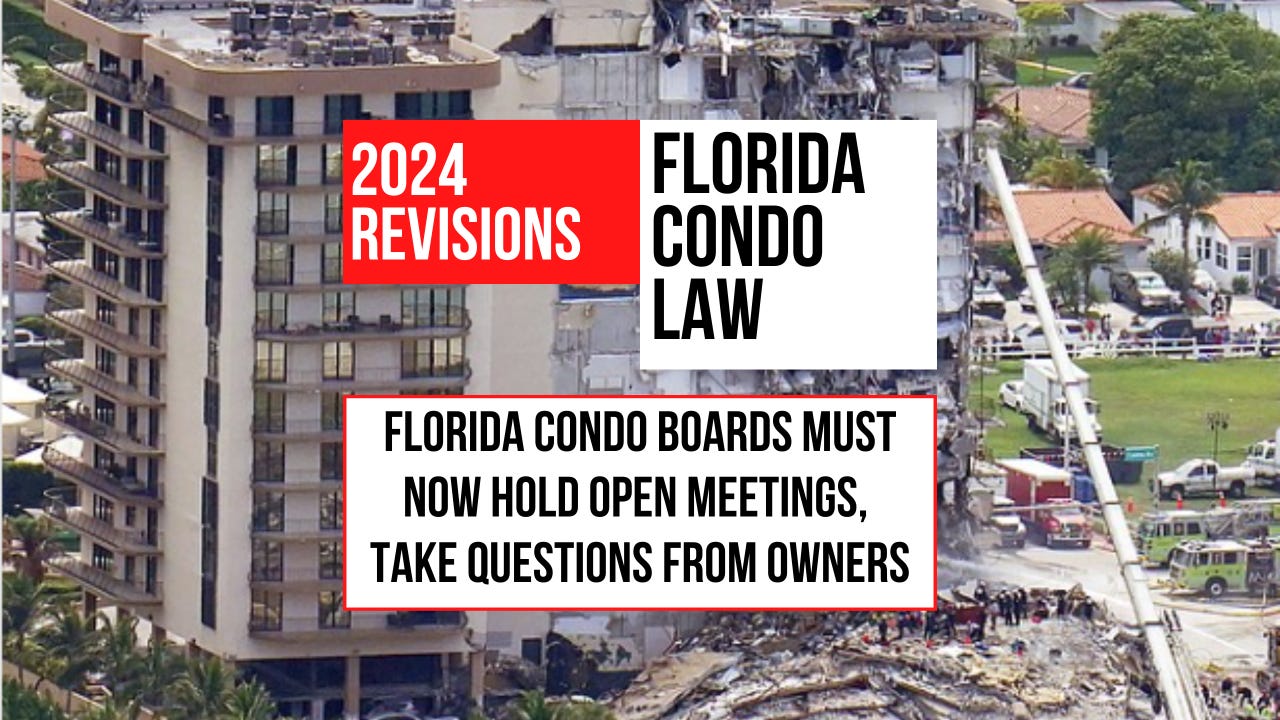Florida Condo Boards Must Now Hold Open Meetings, Take Questions From Owners
In the aftermath of the Surfside condo collapse, the Florida Legislature has made a number of changes to the state's condo law in 2024. This is one of the changes.

Florida condo associations with at least 10 units are now required to hold quarterly board meetings and allow owners - who can purportedly be boisterous and confrontational - to ask questions about agenda items under a series of 2024 revisions to the state’s condo law.
As part of the changes adopted during the recent Florida legislative session, condo boards must now also provide advance notice to units owners when financial topics such as “regular or special assessments” and/or contracts for “goods and services” are scheduled to be discussed and/or voted upon.
In an effort to bring increased transparency, copies of proposed contracts as well as the descriptions and estimated costs for items to be purchased must now be shared with unit owners - and made available for inspection - prior to all votes.
As rudimentary as this may seem in a democracy, it is the first time that a state law - which now overrides the individual condo declarations that govern each respective project differently - would mandate that associations hold open meetings where unit owners can attend, ask questions and even record the proceedings.
The new requirement were added to the Florida condo law as part of the 2024 revisions made during the recent legislative session in March. Florida Gov. Ron DeSantis (R) signed the bill in June, clearing the way for the law to take effect in July 2024.
The measures are part of an ongoing effort by the Florida legislature in the aftermath of the Champlain Towers South condo collapse in the barrier island town of Surfside on June 24, 2021, to bring more transparency to condo associations, which have a reputation for being shrouded in secrecy, intimidation and corruption.
Nearly 100 people died and a $1 billion settlement was reached with the families of the victims.
A federal investigation is currently underway but the preliminary reports suggest a flawed design coupled with a lack of upkeep by the condominium’s association contributed to the disaster.
The Florida legislature has taken a number of steps - prompted by insurance companies threatening to withdraw coverage in the state - to ensure that nothing like this ever happens again.
Up until now, the state’s measures were being implemented slowly but that all changes in 2025.
As part of the changes, condo boards are preparing for a recently passed Florida law that goes into effect in January that requires associations to hire experts to conduct structural integrity studies of their respective buildings and then begin funding the necessary work in or before 2025. Associations can no longer defer the work and the cost.
People are dubbing this moment as the 2025 Condo Association Financial Cliff as it expected to result in significantly higher costs for unit owners.
Some industry watchers have compared it to an inflection point on par with the Category 5 Hurricane Andrew that devastated South Miami-Dade County in August 1992.
Since the 2021 collapse, older units are said to be tougher to sell, insurance prices are spiking year-over-year and association maintenance fees and special assessments are squeezing owners to the brink.




